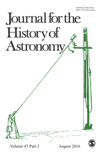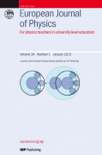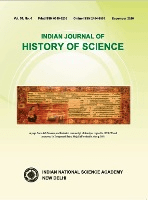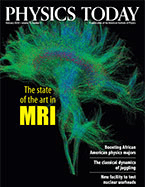
PHYSICS IN PERSPECTIVE
Scope & Guideline
Bridging Time: The Past and Present of Physics
Introduction
Aims and Scopes
- Historical Analysis of Physics:
The journal focuses on the historical development of physics, examining key figures, events, and milestones that have shaped the field. This includes biographical studies, significant experiments, and the evolution of scientific thought. - Interdisciplinary Perspectives:
It emphasizes the intersection of physics with other disciplines such as philosophy, art, and politics, showcasing how these fields influence and are influenced by scientific advancements. - Cultural Context of Scientific Developments:
The journal explores the cultural and societal implications of physics, including how political contexts, such as war and funding, have shaped scientific inquiry and public perception of physics. - Preservation and Interpretation of Scientific Instruments:
A unique aspect of the journal is its focus on the historical instruments of physics, analyzing their significance and the narratives they carry within the scientific community. - Reflections on Scientific Practice:
It also includes autobiographical reflections and personal accounts from physicists, providing insight into the lived experiences and motivations behind scientific work.
Trending and Emerging
- Political Activism in Physics:
Recent publications have increasingly focused on the role of physicists in political movements and activism, particularly in historical contexts such as the Vietnam War, showcasing how scientific communities engage with social issues. - Cultural Narratives in Science:
There is a growing trend towards exploring the cultural narratives surrounding scientific developments, including the relationship between scientific practice and artistic expression, and how these narratives shape public understanding of physics. - Philosophical Reflections on Science:
The journal is seeing a rise in discussions that bridge philosophy and physics, examining foundational questions and the philosophical implications of scientific theories, which indicates a robust interest in the theoretical underpinnings of the discipline. - Historical Context of Scientific Instruments:
An emerging focus on the historical significance of scientific instruments and their role in the development of physics reflects a broader interest in material culture and the artifacts of science. - Autobiographical and Reflexive Accounts:
The trend towards autobiographical reflections from physicists indicates a growing interest in personal narratives that contextualize scientific practice within individual experiences and historical moments.
Declining or Waning
- Traditional Physics Theories:
There has been a noticeable decrease in papers that focus solely on traditional physics theories and principles without contextual analysis, indicating a shift towards a more interdisciplinary approach. - Technical and Experimental Physics:
Papers strictly centered on technical aspects of experimental physics appear to be waning, as the journal emphasizes historical and philosophical discussions over purely technical discourse. - Narrowly Focused Biographies:
While biographies of physicists remain important, the trend is moving away from narrowly focused studies that do not connect to broader historical or cultural themes. - Quantitative Analysis of Physics:
There seems to be less emphasis on quantitative analyses or statistical studies within the historical context, as the journal appears to prioritize qualitative narratives and critical reflections.
Similar Journals

HISTORY OF SCIENCE
Bridging Eras: The Journey of Scientific DiscoveryHISTORY OF SCIENCE, published by SAGE PUBLICATIONS LTD, stands as a pivotal journal in the domain of historical studies, with a focus on the development and evolution of scientific thought and practice throughout history. With an ISSN of 0073-2753 and an E-ISSN of 1753-8564, this journal is recognized for its commitment to high-quality research, as evidenced by its categorization in the Q2 quartile for History and Q3 for History and Philosophy of Science in 2023. Spanning a converged history from 1962 to 2024, the journal serves as an essential platform for scholars, providing in-depth analyses and discussions that foster a deeper understanding of the interplay between science and its historical context. As a well-regarded source in the field, it ranks #140 out of 1760 in Arts and Humanities History and maintains a commendable 92nd percentile ranking, highlighting its influence and reach among researchers and professionals alike. Although not an Open Access journal, it remains accessible to students, scholars, and practitioners in the field, bridging the past and present of scientific inquiry.

JOURNAL FOR THE HISTORY OF ASTRONOMY
Navigating the Historical Universe of AstronomyJournal for the History of Astronomy, published by SAGE Publications Ltd, is a distinguished platform for scholars and enthusiasts interested in the evolution of astronomical thought and practice from 1970 to the present. With its ISSN 0021-8286 and E-ISSN 1753-8556, this journal serves the global academic community by publishing rigorous research and insightful articles that explore the intersection of astronomy with history, philosophy, and culture. Although the journal has a more modest impact factor, as indicated by its Q3 classification in Arts and Humanities and Q4 in Astronomy and Astrophysics, it remains a significant resource for understanding the historical contexts and developments of astronomical science. Researchers can access a wealth of information that contributes to enhancing their understanding of the broader implications of astronomical advancements. The Journal for the History of Astronomy provides a unique forum for examining past contributions to the field, engaging readers who seek to appreciate the legacy and ongoing narrative of astronomy particularly in the United States and beyond.

Revista Colombiana de Filosofia de la Ciencia
Bridging Disciplines, Inspiring New PerspectivesRevista Colombiana de Filosofia de la Ciencia, published by UNIV EL BOSQUE, stands as a pivotal platform for the dissemination of knowledge in the field of philosophy of science. With a commitment to open access since 2010, this journal not only enhances the accessibility of crucial scholarly work but also encourages collaboration and dialogue among researchers, professionals, and students alike. Featuring an ISSN of 0124-4620 and an E-ISSN of 2463-1159, the journal fosters critical discussions on the implications and underpinnings of scientific thought, promoting an enriched understanding of how philosophical frameworks can shape scientific practices. The journal aims to bridge disciplines, inspiring new research pathways while contributing to the philosophical discourse surrounding science in Latin America and beyond. This dedication places the Revista Colombiana de Filosofia de la Ciencia as a leading voice in its field, making it an essential read for anyone looking to deepen their engagement with the philosophy that informs scientific investigation and theory.

European Journal for Philosophy of Science
Fostering Interdisciplinary Insights in Science and PhilosophyThe European Journal for Philosophy of Science, published by SPRINGER, stands as a prestigious platform for scholars in the realms of philosophy and history of science. With an impressive impact factor and categorized in the Q1 Quartile for both History and Philosophy of Science and Philosophy, this journal ranks among the top 10% of its peers, reinforcing its critical role in advancing academic discussions and insights within these fields. With its composition of rigorous peer-reviewed articles and a commitment to fostering interdisciplinary dialogue, the journal navigates foundational and contemporary issues that shape scientific inquiry. Although currently not Open Access, it provides invaluable access to researchers, professionals, and students who seek to deepen their understanding of the philosophical underpinnings of scientific practice. Housed in the Netherlands, the journal continuously engages with the evolving landscape of philosophy in the scientific domain, making it a key resource for anyone invested in the intersection of science and philosophy.

European Physical Journal H
Enriching the Narrative of Physics with Open Access InsightsThe European Physical Journal H (EPJ H) is a distinguished peer-reviewed academic journal dedicated to the history and philosophy of physics, published by SPRINGER HEIDELBERG in Germany. With an ISSN of 2102-6459 and an E-ISSN of 2102-6467, the journal aims to bridge the gap between historical context and contemporary scientific advancements in the field of Physics and Astronomy. Although it holds a Q4 quartile ranking in the 2023 category for Physics and Astronomy (miscellaneous) and occupies the 161st position out of 243 in Scopus rankings, EPJ H has a vital role in facilitating discourse among researchers and educators interested in retracing the evolution of concepts and discoveries within physics. Emphasizing the importance of interdisciplinary dialogue, the journal provides open access options to ensure that its scholarly contributions are readily available to a global audience, thereby enhancing educational resources and research visibility. The timeline of publication spans from 2010 to 2024, making it an up-to-date resource for those exploring the intricate historical landscape of physical sciences.

EUROPEAN JOURNAL OF PHYSICS
Charting New Territories in Scientific InquiryEuropean Journal of Physics, published by IOP Publishing Ltd, is a premier international journal serving the diverse field of physics and astronomy. With a commitment to advancing scientific knowledge since its inception in 1980, the journal provides a platform for original research articles, reviews, and topical discussions in various domains, including theoretical and experimental physics. Operating out of the United Kingdom, the journal has achieved a commendable Q2 ranking in the Physics and Astronomy (miscellaneous) category for 2023, reflecting its robust influence in the academic community, alongside a notable Scopus Rank that underscores its relevance in both the Social Sciences and General Physics and Astronomy fields. Although it does not currently offer open access, the journal's traditional publication model ensures rigorous peer review, maintaining high scholarly standards that are imperative for researchers, professionals, and students striving to stay ahead in their respective fields. Don't miss the opportunity to engage with cutting-edge research and contribute to the ongoing dialogue in physics by accessing this vital resource.

INDIAN JOURNAL OF HISTORY OF SCIENCE
Exploring the Rich Tapestry of India's Scientific LegacyINDIAN JOURNAL OF HISTORY OF SCIENCE, published by the Indian National Science Academy, offers a vital platform for researchers, professionals, and students dedicated to the exploration of the historical development of science and technology in India and beyond. With the ISSN 0019-5235 and E-ISSN 2454-9991, this peer-reviewed journal aims to promote interdisciplinary collaboration by publishing original research articles, reviews, and discussion papers that highlight the contributions and evolution of scientific thought throughout history. The journal fosters a unique understanding of how historical contexts have shaped current scientific paradigms, making it an essential resource for academic inquiry. Although it does not currently offer Open Access options, the journal's rigorous editorial standards ensure that it maintains a significant impact within the scholarly community, serving as a crucial reference point for historical scholarship in the sciences. Its address in Bahadur Shah Zafar Marg, New Delhi 110 002, India, situates it within a rich tapestry of cultural and academic heritage, further enhancing its significance in the field.

Nuovo Cimento C-Colloquia and Communications in Physics
Fostering Dialogue in Physics and AstronomyNuovo Cimento C-Colloquia and Communications in Physics is a distinguished peer-reviewed journal published by the SOC ITALIANA FISICA, dedicated to the dissemination of novel research and communications in the vibrant fields of Astronomy and Physics. Established in 1978, this journal provides a platform for scientists and researchers to present their findings, fostering academic dialogue and collaboration within the community. As of 2023, the journal holds a Q4 quartile ranking in both Astronomy and Astrophysics and Physics and Astronomy (miscellaneous), reflecting its commitment to contributing to the scientific corpus despite its emerging status in the competitive landscape. Based in Italy, the journal is accessible to a global audience, enhancing its reach and influence. Although currently not an open access journal, it remains an essential resource for researchers and professionals seeking to stay informed on cutting-edge developments in physics and astronomy. Its ongoing convergence of knowledge from 1978 to 2024 promises to enrich the scholarly discourse and advance the frontiers of research in these dynamic fields.

Nuncius-Journal of the History of Science
Exploring the Crossroads of Science and HistoryNuncius - Journal of the History of Science, published by BRILL, is a vital resource dedicated to the exploration and analysis of the intricate relationship between science and its historical context. Established with the goal of fostering scholarly discussion, this journal serves as a platform for researchers and historians to present their findings and interpretations regarding the evolution of scientific thought. With an impact factor reflective of its academic rigor and ranked in the Q3 category in the field of History and Philosophy of Science, it offers a rich archive of articles spanning converged years from 1986 to 2024. Nuncius encourages submissions that advance the understanding of science's impact on society, culture, and its philosophical underpinnings, making it a key reference for those engaged in the histories that define modern scientific inquiry. Situated in the scholarly landscape of the Netherlands, Nuncius remains an essential read for professionals, students, and academics seeking to deepen their knowledge in this significant field.

PHYSICS TODAY
Charting the Course of Modern Physics and AstronomyPHYSICS TODAY is a prestigious journal published by the American Institute of Physics, serving as a pivotal platform for the dissemination of innovative research and developments in the field of physics and astronomy. With an ISSN of 0031-9228 and an E-ISSN of 1945-0699, this journal has been in circulation since 1948 and is set to continue until 2024. Recognized for its substantial contributions to the scientific community, PHYSICS TODAY holds a significant position within the Q2 quartile of the Physics and Astronomy category as of 2023. Although it does not offer open access, its articles remain crucial resources for researchers, professionals, and students seeking to stay abreast of the latest advancements across a broad range of topics in general physics and astronomy. With a current Scopus ranking of #150 out of 243 and a percentile standing at 38, the journal bolsters its reputation as a reliable source for high-quality scientific discourse. In an era of rapid scientific advancement, PHYSICS TODAY remains dedicated to fostering a deeper understanding of the physical universe, making it an essential read for those invested in the future of physics.